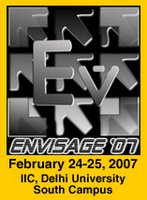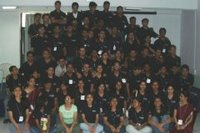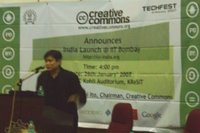At a Bureau of Indian Standards (BIS) seminar on Feb 21st in New Delhi on “IT Standardization”, Mr. Craig Mundie, Chief Research and Strategy officer of Microsoft delivered the inaugural keynote.
Curiously, no industry representative besides Microsoft was allowed to be part of the formal presentations. The BIS leadership — Alka Sirohi (Director General), Rakesh Verma (Addl. Director General), Sukhbir Singh (Deputy Director General) along with the Secretary of Consumer Affairs Mr. Bhave — were all present, deeply worshipful of and indebted to their chief sponsor.
Mr. Mundie zealously discussed the need for standardization through interoperability. In the digital world, standardization should no longer be thought of in terms of uniformity but rather in terms of translatability and interoperability. Mr. Mundie explained that interoperability achieved through meta description languages like XML is key to practical standardization. Single solutions that emphasize uniformity of standards are not the answer. If Microsoft really followed Mr. Mundie’s advice, perhaps we’d all live in a less contentious digital world.
However, other Microsoft sponsored presentations lionized the need for IPR protection as the basis for healthy standardization — proposing a so-called “virtuous cycle” of digital products: R&D developed IPR flows into products which then flow into the consumer market and then, through market results, back into R&D. But, somehow without the guiding hand of industry and protection of its IPR, the virtuous cycle short circuits and no innovation is possible.
Now, if I had been invited onto the dias, to keynote alongside Mr. Mundie, my presentation would have included the following. I would have congratulated Mr. Mundie on his vision for redefining standardization in the digital age. I would then have taken the opportunity to inform him of all the wonderful FOSS products, like ODF and OpenOffice, that his company could support on the road to full interoperability.
But I would have been less generous toward the IPR proponents: How can all innovation only come from absolute IP control. Today, India is at a deadly disadvantage in the IT IP regime game. India cannot be regarded as a serious contender at all. Innovation in India should be allowed from anywhere and everywhere. FOSS can provide a level playing field that allows innovation and creativity to grow from within. So why play this one-sided “Innovation = IP” game? Why lock ourselves out of the game with the rules of the leaders before we’re even ready to play.
Perhaps my turn on the dias at a future BIS Seminar will come. I look forward to being their next chief guest!
 If you happen to be in Delhi next weekend on February 24-25, come and visit Envisage’07, the annual inter-collegiate open source technical festival organized by the students and faculty of the Institute of Informatics and Communications (IIC), University of Delhi. A range of competitive challenges, both technical and non-technical will be held. The event is FREE – so stop by and encourage the engineering students and faculty of IIC and participating teams from all over the country. For more information check out
If you happen to be in Delhi next weekend on February 24-25, come and visit Envisage’07, the annual inter-collegiate open source technical festival organized by the students and faculty of the Institute of Informatics and Communications (IIC), University of Delhi. A range of competitive challenges, both technical and non-technical will be held. The event is FREE – so stop by and encourage the engineering students and faculty of IIC and participating teams from all over the country. For more information check out  I always feel that Pune has a special buzz especially when it has to do with open source. Students from many colleges and developers from local IT companies such as Infosys, Red Hat, Persistent, Thoughtworks, Celunite all join in to make GNUnify successful. The Pune LUG is also refreshingly participatory and conducts very successful install fests!
I always feel that Pune has a special buzz especially when it has to do with open source. Students from many colleges and developers from local IT companies such as Infosys, Red Hat, Persistent, Thoughtworks, Celunite all join in to make GNUnify successful. The Pune LUG is also refreshingly participatory and conducts very successful install fests! Joichi Ito (chairman of Creative Commons) and Catharina Maracke (international legal advisor for Creative Commons) led the inauguration. Joi was awesome. He talked about his interaction with media companies and governments who are on the DRM bandwagon and how technologies including open source software were key in a paradigm shift towards more choice for creators and consumers of music, movies, and knowledge. Dr. Phatak expressed his interest in promoting the CC licenses for content. He felt these licenses are a better fit for knowledge than some software oriented licenses.
Joichi Ito (chairman of Creative Commons) and Catharina Maracke (international legal advisor for Creative Commons) led the inauguration. Joi was awesome. He talked about his interaction with media companies and governments who are on the DRM bandwagon and how technologies including open source software were key in a paradigm shift towards more choice for creators and consumers of music, movies, and knowledge. Dr. Phatak expressed his interest in promoting the CC licenses for content. He felt these licenses are a better fit for knowledge than some software oriented licenses.